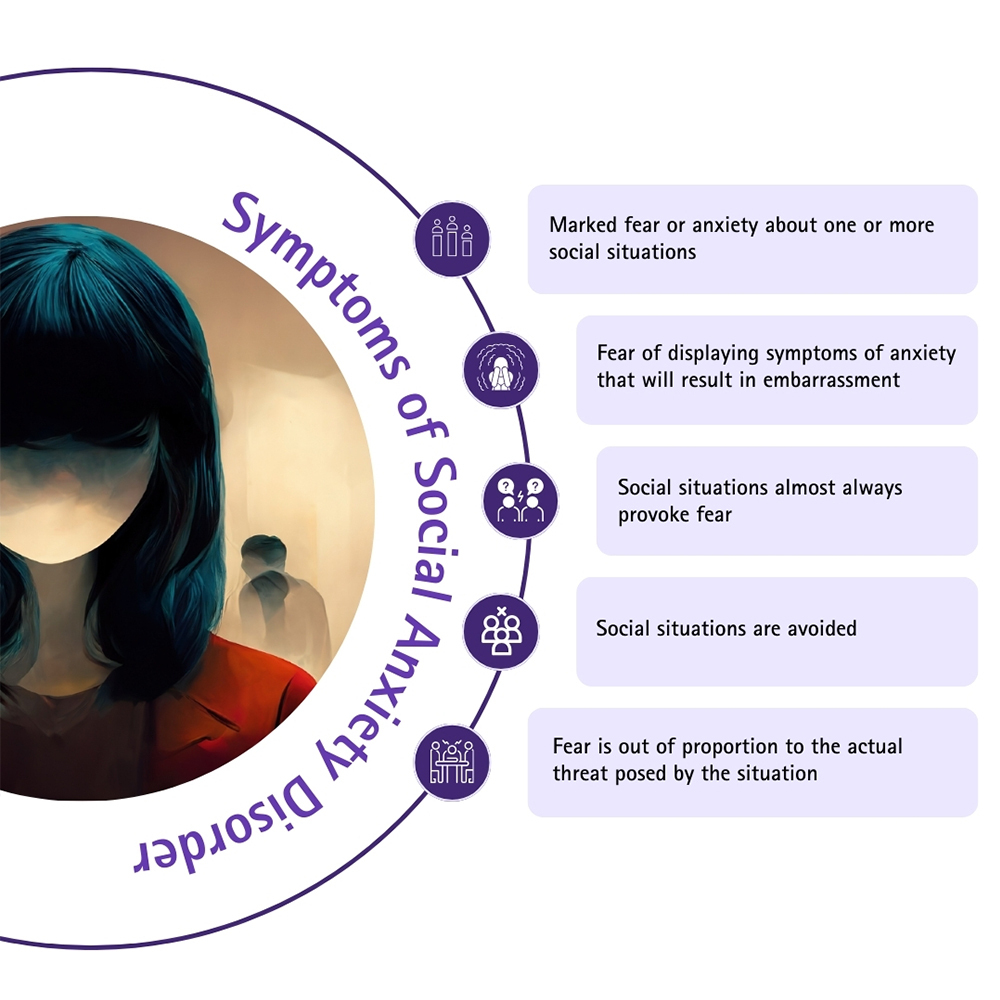Through evidence-based approaches, compassionate support, and proven techniques, we empower you to regain control, conquer your fears, and thrive in social situations. Discover the power of effective social anxiety treatment for a brighter future.
What Is Social Anxiety Disorder (Social Phobia)?
Social Anxiety is a common, disabling, and treatable mental health condition characterized by fear or excessive worry about being in social situations. People with this disorder have a fear of being judged, embarrassed, or humiliated by others. To be considered a mental health diagnosis, the fear must be more significant and debilitating than normal nervousness associated with social situations.
According to the Diagnostic and Statistical Manual (DSM-5), symptoms of social anxiety disorder include:
- Marked fear or anxiety about one or more social situations
- Fear of displaying symptoms of anxiety that will result in embarrassment
- Social situations almost always provoke fear
- Social situations are avoided
- Fear is out of proportion to the actual threat posed by the situation
To be diagnosed with social anxiety disorder, or social phobia, the fear and anxiety must last for over 6 months and cause significant impairment to work, social life, or other areas of functioning.
Are There Different Types of Social Anxiety?
 The difference between different types of social anxiety depends on the situation the person feels anxiety.
The difference between different types of social anxiety depends on the situation the person feels anxiety.
Types of social phobias include:
- Performance anxiety: This is the fear of speaking in front of others such as a speech, presentation, or stage performance.
- Academic anxiety: This often presents when an individual has to take a test or participate in class in front of other people.
- Dating/relationship anxiety: This involves the fear of dating, relationships, or intimacy with others.
- Interpersonal anxiety: This form is more common as it has to do with a fear of having conversations, meeting new people, maintaining eye contact, or making new friends.
It is possible to live with more than one type of social phobia. When you speak with a therapist you can better understand which type of social anxiety you are experiencing. Your trauma therapist will help you learn coping skills and identify strategies to reframe your thoughts to alleviate your symptoms.
What Causes Social Anxiety Disorder?
Social anxiety disorder can be caused by several factors including:
- Genetics: If someone in your family experiences anxiety, it is more likely you will experience symptoms as well.
- Environment: Our environment plays a large role in our feelings, perceptions, and experiences.
- Brain chemistry: Anxiety can be caused by imbalances in neurotransmitters such as serotonin and norepinephrine.
- Social learning: At times, our behaviors and even emotions can be learned and mirrored from our caregivers.
While these are common causes that contribute to social anxiety, other factors may be present as well. Whatever the cause of your social anxiety, it is important to remember there is a treatment that can help reduce your symptoms.

How Is Social Anxiety Disorder Diagnosed?
Social anxiety disorder can be diagnosed by a therapist, counselor, psychologist, or psychiatrist.
These mental health professionals may use the following methods to help them diagnose your condition:
- Interview: Your therapist will ask you questions about your current situation, as well as your history.
- Diagnostic criteria: Therapists will use the DSM-5 to match your symptoms to the disorder.
- Assessments: There are several standardized assessments therapists may use to identify if you have certain disorders.
Therapists have specific tools and education on all disorders so it is important to seek help from a clinician to obtain a proper diagnosis.
Is Social Anxiety Disorder Treatable?
Social anxiety disorder is treatable. With treatment, you can live free of excessive fear and worry regarding social situations.
According to research the most effective treatments for social anxiety disorder include:
- Medication: According to a study in PubMed, “Drug treatment consists of serotonin-reuptake inhibitors, monoamine oxidase inhibitors, or high-potency benzodiazepines.”
- Cognitive behavioral therapy (CBT): CBT is a highly effective treatment that helps challenge negative thoughts and dispute irrational beliefs.
- Mindfulness: Being present by observing the moment can help you cope with and decrease symptoms of social phobia.
Your therapist may recommend other interventions for your social anxiety. Oftentimes, you may need to try different things before you find your favorite coping skill, or even more likely, a combination of the ones that work best for you.
Embrace Healing The Power of Trust in Therapeutic Relationships
“In my experience, the most effective aspect of therapy is the therapeutic relationship. Establishing trust between a client and clinician is the first step to healing.”
What Medications Are Used to Treat Social Anxiety Disorder?
Medications that are used to treat Social Anxiety Disorder include:
- Sertraline (Zoloft)
- Fluoxetine (Prozac)
- Paroxetine (Paxil)
- Venlafaxine (Effexor)
- Duloxetine (Cymbalta)
- Clonazepam (Klonopin)
- Lorazepam (Ativan)
- Gabapentin
Some other medications may include beta-blockers such as propranolol or monoamine oxidase inhibitors (MAOIs).
What Are the Risk Factors for Developing Social Anxiety?
Some factors that influence the development of social anxiety disorder include:
- Genetics: Sometimes if someone in your family lived with social anxiety or any other mental health condition, you would have an increased risk for that disorder.
- Brain chemistry: Imbalances in neurotransmitters such as serotonin and norepinephrine can cause social anxiety.
- Childhood experiences: Our early childhood experiences play a large part in our personality in later life. Trauma and adverse childhood experiences can put someone at higher risk for social anxiety disorder.
- Environment: A stressful environment can lead to social phobias. Growing up in a stressful environment, for example, parents who set unreasonably high expectations for their children can also lead to social anxiety disorder.
Other factors can increase the risk of developing social anxiety, such as cultural and social factors. Also, it’s important to note that all of these risk factors do not necessarily mean an individual will certainly develop social phobia disorder.
Can Therapy Benefit Social Anxiety?
The following therapy interventions have been shown to have the highest success rates:
- Cognitive behavioral therapy (CBT): CBT can help by identifying and changing the negative thought patterns that lead to social anxiety disorder symptoms.
- Exposure therapy: Exposure therapy allows clients to come in contact with their social anxiety triggers in a safe and controlled environment. This therapy desensitizes you to the feelings associated with anxiety by allowing them to dissipate over time.
- Mindfulness and acceptance-based treatments: These therapies help you change your relationship to negative feelings, instead of trying to change them.
Social anxiety therapy can help you improve your confidence by shifting negative thought patterns to feel more comfortable in social settings.
Do I Need Therapy for Social Anxiety?
You can decide if you need therapy for social anxiety by considering the following quote by Tony Robins, “Change happens when the pain of staying the same is greater than the pain of change.”
Some factors to consider when deciding on therapy include:
- Severity and duration of your symptoms: If your symptoms have been severe and long-term and other things have not been working, it may be time to seek a professional level of support.
- Emotional distress: If your symptoms are causing you emotional distress, therapy can only improve your symptoms.
- Desire for change: Sometimes your symptoms don’t need to get debilitating before you decide to work on changing your patterns.
- Avoidance of social situations: If you have been avoiding social situations and events due to your social phobia, therapy can help you learn techniques to begin socializing comfortably.
- Current emotional distress: Therapy can provide tools for coping with negative feelings and low self-esteem from social anxiety disorder.
- Impacts on quality of life: Therapy is a good option to improve your overall quality of life.
Therapy is a proactive step in improving your life by learning skills that can help you cope with and combat negative thoughts that trigger social anxiety.
Call an experienced social anxiety therapist today!
(561) 363-7994How to Get Treatment for Social Anxiety?
To find treatment for social anxiety take the following steps:
- Research: Look up different therapists online. You may consider the therapist’s experience, pricing, and insurance they accept, and don’t forget to trust your gut.
- Ask for referrals: You can ask friends, family members, or your primary care physician for a therapy referral.
- Read therapist profiles: Therapists often write short bios describing who they are, what is important to them, and their specialties.
- Consider reviews: Sometimes clients leave reviews about their therapists. Read through these, but remember to take it with a grain of salt.
- Ask for a consultation: Some therapists offer 10-minute consultations where you can ask questions about how they work and get to know them.
- Schedule a session: You will never find the right therapist for you without scheduling a session.
Finding treatment for social anxiety disorder may take some work, but it is an investment in your mental health and well-being.

